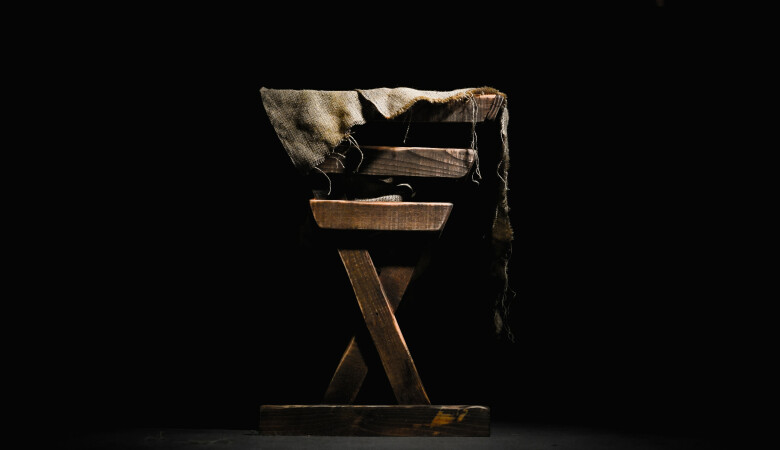The Weakness of God
December 22, 2002 | Andy Davis
1 Corinthians 1:25
The “Weakness of God”? How Can It Be?
I would like to ask, if you would, to take your Scriptures and open to 1 Corinthians chapter 1. This morning we are going to be looking at Christmas as a demonstration of the weakness of God. We get this from 1 Corinthians 1:25, which Wiley just read for us: “For the foolishness of God is wiser than man’s wisdom and the weakness of God stronger than man’s strength.” And anyone who’s familiar with the Scriptures, who knows the God of the Bible, should just in a way buck or stumble at that concept of the weakness of God. For the God that we worship is an omnipotent God. He is powerful, he can do all things. He displayed his omnipotence, his power when he created the universe. There was a time that he was alone: Father, Son, and Spirit. And he simply spoke the universe into existence. He spoke in worlds, his command obeyed. He said, “Let there be light” and there was light. He said, “Let there be an earth, let there be a sky, let there be oceans, and let them be gathered in one place,” and they were. And the oceans, they rule where they’re supposed to be, but they will not cross that thin band of sand that he establishes their boundary because he rules the waves. He’s the omnipotent creator, and he created all things by the word of his power and for his glory.
The Omnipotence of God
This is the one that we speak of when we speak of the weakness of God, how can it be? We also see the omnipotence of God, the providential ruler. Not only did he create the universe, but he also rules over it moment by moment. We are not Deists who believe that God created the world and then just sits back and lets it run as a clockmaker lets a clock run that he has designed. But no, we worship an interfering God, a God who gets involved in history, he is the King of Kings and the Lord of Lords. No one can take a throne of earthly power unless by his will and his permission. Every throne is established by him, and he raises one up and he lowers another. And just as it is true that a sparrow cannot fall to the ground apart from the will of our providential ruler (Matthew 10:29), neither can the Roman Empire fall to the barbarian hordes except that God says so.
Now, this is the God that we roll. “The lot is cast into the lap, but its every decision comes from the Lord” (Prov 16:33). Every roll of the dice that comes up the way he says. Every happenstance meeting between people and Asian cities, all of it ruled by God. Every event recorded on page 36 of your local newspaper, God rules over all these things.
This is the one that we’re speaking of when we speak of the weakness of God, how can it be? And then there is God, the miracle worker. God established physical laws of the universe, and it’s been our delight as a human race to try to discover what they are, to try to find out what God has done in creation, and we have. We have accomplished great things, and we’ve seen the laws that he has made, but God breaks them any time he chooses. Any time he wants, he can make an ax head float in water. Any time he wants, he can have a staff turn into a serpent, and then back again; a hand can become leprous and then be healed again instantly; plagues can come on a nation, a whole river can turn to blood, even water in a pitcher on a table, clean and ready to drink a moment ago suddenly turns to blood. Our God is a miracle-working God.
He can do anything. He can make an ocean separate and two million people walk through safe and sound with water walling up left and right, and then he can give the word and that same water comes crashing down on the pursuing army. Our God is a miracle-working God. He’s an interfering, sovereign miracle-working God, and this is the one that we’re speaking of when we talk about the weakness of God, how can it be?
He dwells on a throne that’s unapproachable. The Scripture says, he alone dwells in unapproachable light (1 Tim 6:16). He speaks and it is so. His hand is stretched out and no one can turn it back (Isa 14:27). No one can turn his mind, he’s very strong-willed. You may think you know people that are strong-willed, no one has a stronger will than God. Nobody can resist his will.
Well, this is the God that we serve. He is king, he has absolute character, no one can sully his character, no one can come in and change him in any way. All of his interactions with the sinful human race have not left him any less holy for our God never changes. This is the God of the Bible. And were it not for 1 Corinthians 1:25, I would think it’s almost blasphemy to speak of the weakness of God, because our God is an omnipotent, a powerful Creator.
The Ultimate Question of Christmas: How Can Such a Being Be “Weak”?
Now, the question of Christmas, I think is, how can such a God become so weak? How can such a God become so weak? Look at 1 Corinthians 1:23-25. The Apostle Paul says there, “We preach Christ crucified, a stumbling block to Jews and foolishness to the Gentiles, but to those whom God has called, both Jews and Greeks, Christ the power of God and the wisdom of God. For the foolishness of God is wiser than man’s wisdom, and the weakness of God stronger than man’s strength.” So here, this concept is introduced to us with the apostolic seal of approval. We are allowed to contemplate this morning, the weakness of God.
Christ: the “Weakness of God”
Now, Paul, when he brought up that phrase, was thinking about Calvary, wasn’t he? He was thinking about the cross of Jesus Christ. I am going to bring it right down to the manger at Bethlehem and show that the whole life was cut from the same cloth. All of it could be demonstrated to be what Paul will call the weakness of God, and I’m going to show that he lived a consistent life from the manger in Bethlehem right to the cross. It was all cut from the same cloth: the weakness of God, Paul would call it. And I’m going to show that it is in fact stronger than the mightiest power of man. The weakness of God is stronger than man’s strength. That tiny baby in that manger in Bethlehem became weak so that we might become mighty and powerful through Christ, that we might have eternal life. He became poor so that we might become rich. This is the mystery of Bethlehem.
Corinthian Context
Now, I can’t preach on 1 Corinthians 1:25 without giving you some context. This is the closest I am going to come to a topical sermon. This happens every Christmas, and so I preach a topical sermon on Christmas. But even so, I want this passage to flower in its context because I think in understanding the Corinthian context, we are going to see how it would apply to our lives today.
You see, the Corinthian church, I don’t think was very different from our church or any other church that you could attend, it was a gifted church. They had everything they need, they didn’t lack any spiritual gift, they had all advantages, but they had nothing but troubles, nothing but problems because they were weak and immature spiritually. They didn’t understand the Christian life properly. They didn’t understand the weakness of God. They were endowed with spiritual gifts but they were bloated with pride. There were factions and there were divisions among them. They were living, some of them, carnal lifestyles, sinful even. They needed to come to Bethlehem and learn the lesson there of that baby lying in that feeding through. They needed to come again to Calvary and understand what it meant that God’s Son was dead on a cross. They needed to see again the weakness of God.
Now, when Paul came to preach, he had just gotten off of a mission trip to Athens and it hadn’t gone well, humanly speaking. He had been there in the Areopagus, and all of those philosophers that do nothing but sit around all day long and talk about wisdom and they talk about the wisdom of Plato and Aristotle, and all of these great philosophers, along comes this Jewish man, and he’s babbling about some man, some carpenter who died and rose again. It didn’t go well, and I think they spurned the message as being weak and foolish. The foolishness of his preaching message was foolish. And they spurned the cross, they despised it, they called it foolishness that a dead man could do anything for anybody at all. And so, he was rejected, and he went from Athens and came to Corinth. And he came there, he says, with weakness and fear and much trembling, and he preached the gospel, and God raised up some people to believe, and he met with them and he discipled them and trained them, and so a church grew up there and it’s to that church that he wrote. But they had some problems because after he left, some false teachers came in, began to question his authority, began to point to a new kind of life, a victorious life, a triumphant life, a life ever upward, ever higher and higher all the time.
And Paul said, “You know, I don’t think you understand. You’re going one direction, I as an apostle, and the rest of his apostles, we seemed to be going the other way. You always want to get wealthier and have a better reputation and be more comfortable and have the people think well of you. You’re going up, you’re becoming like kings, but we are like the offscouring at the end of a procession, we are despised and rejected. And you know what, so is Jesus. You don’t seem to understand the very journey that Jesus took leaving heaven and coming down to Bethlehem, and then the kind of life that he lived, and then how he died. The weakness of God is stronger than man’s strength. You need to understand the Christian life differently.”
And so he gives them in the first chapter, three different aspects of God’s weakness, or his foolishness. First of all, the very idea of a dead Messiah, a crucified Christ up on the cross, that’s foolishness, and yet it saves our souls. And then he says, “Look at yourselves, you know you’re not the pick of the litter actually, you’re not the first prize at the fair. There were not many among you that were influential, not many of noble birth, but God chose the weak, and the lowly, and the despised among you. So look at yourselves. What is God doing among you? Lest you forget your humble origins.”
And then he says, “Look at me, God chose me, someone like me, to bring you the gospel.” Chapter 2, he says, “When I was with you, I was with you in weakness and fear and much trembling. I didn’t come with a display of human power and prowess, and reasoning, and articulation, I came relying only on this… the cross of Jesus Christ, Jesus dead on the cross, that’s what I came to preach. I had no other message and look what happened as a result.” And so he’s portraying before them the weakness and the foolishness of God.
The Weakness of Christ
Now what I’m doing is I’m taking that main concept and I’m bringing it back to Bethlehem, and I’m showing you that the whole life was done this way. Do you realize that God didn’t have to do it this way? I believe we needed a flesh and blood savior to come and take our place on the cross. He needed real red blood coursing through his veins because without the shedding of blood, there is no forgiveness (Heb 9:22).
But he didn’t have to do it this way. I believe that God was accomplishing more than one thing here, and one of the things he was accomplishing by the manner in which Jesus entered the world is teaching us what he esteems, teaching us the way we should be. He was our role model, and his journey was downward in this world.
Now in the next… nothing but upward because God opposes the proud but gives grace to the humble (James 4:6). “Therefore, God exalted him to the highest place,” it says (Philippians 2:9). So, if you were willing to live this kind of life, the meek life, the lowly life, the manger life, the cross life, then unlimited blessings come to you through the omnipotent God that we talked about at the beginning.
Christ’s Lowly Incarnation
Now, if we look at the weakness of Christ, we see first the weakness in his lowly incarnation. Jesus was weak when he was conceived. Now, you stop and think about that. Jesus was conceived, he was at one point an embryo, what some people disparage as a mass of cells. Jesus was an embryo. He was what some people disparage as a fetus, which means in Latin a young one, little one. He was inside his mother’s womb. Mary couldn’t understand that, she didn’t know how it could be because she had never known a man, and so she said in Luke 1:34-35, “’How will this be?’ Mary asked the angel, ‘since I’m a virgin.’ The angel answered, ‘The Holy Spirit will come upon you and the power of the Most High will overshadow you. And so, the Holy One to be born will be called the Son of God.’”
And so in a mysterious way, Jesus was formed physically inside Mary. Psalm 139 says, “You created my inmost being, you knit me together in my mother’s womb. I praise you because I’m fearfully and wonderfully made. Your works are wonderful. I know that full well. My frame was not hidden from you when I was made in the secret place when I was woven together in the depths of the earth. Your eyes saw my uniformed body. All the days ordained for me were written in your book, before one of them came to be.”
Now, David was writing that about himself, but Jesus was the Son of David, was he not? According to the flesh? And so, in the same way, Jesus could speak these words to his Heavenly Father: “You knit me together in my mother’s womb.” And so, what that means is, if Jesus developed physically inside his mother the way you did inside your mother, at 21 days, Jesus’s heart began to beat. Why did God give Jesus a physical heart? Why the blood? Well, that heart would not stop beating until Jesus said the words, “It is finished.” And the blood that flowed through his veins inside his mother’s womb would eventually flow out of his body as an atoning sacrifice for our sins. This is the purpose.
And yet at 21 days, his body could have been ripped to shreds by a little needle, that’s the weakness of God, the weakness of God, the omnipotent creator, down to that tiny, small level, and so Jesus was weak when he was conceived. This is a great mystery, isn’t it? Michael Card, one of my favorite lyricists wrote this, “When the Father long to show a love he wanted us to know, he sent his only Son and so became a holy embryo. No fiction,” listen to this now, “No fiction as fantastic and wild, a mother made by her own child.” Wow! Mary was made by Christ, yeah, Colossians 1 teaches that, and then she became the mother of his physical body. The hopeless babe who cried was God incarnate and man deified. That is the mystery, more than you can see, give up your pondering and fall down on your knees.
Jesus was weak when he was conceived, he was weak as a conquered Jew. He didn’t come into the world as a son of Caesar; he could have. God could have chosen that way, but he came into the world as a conquered Jew. Now, he could have come into the world as a triumphant Jew. God had the power to make David the emperor of the universe if he wanted to, and then have one series of Jewish kings after another, just ruling the whole place. It wasn’t that way.
When Jesus was born, he was born into a conquered race. And so as a result, in order to fulfill prophecy that he would be born in Bethlehem, Jesus’s parents, human parents, Joseph and Mary, had to obey a decree from Caesar Augustus that a census should be taken of the entire Roman world and they had to travel down to Bethlehem. And so Jesus was inside his mother and traveled a long, weak, obedient to Caesar’s command, a conquered Jew. He was weak also when he was born a baby, the very passage that Mac and Eulene read this morning. Luke 2:6-7, “While they were there, the time came for the baby to be born, and she gave birth to her firstborn son.” And it says, “She wrapped him in cloths and placed him in a manger.”
And you know the difference between an active and a passive verb. Active verb does the actions. Passive verb receives the action. Jesus is passive. He’s a baby, he’s wrapped, he’s placed, he’s weak. Joseph, would you clean out that manger? Maybe we can use that as a bassinet. An incredible thing. He could barely move the straw that was around him, the very picture of weakness. And Jesus was weak through poverty. He was not born to a wealthy Jewish family—there were wealthy Jewish families at the time. There were, but Jesus was born into poverty. How do we know that? Well, the offering that Mary made after Jesus was born in Luke Chapter 2, it says, “When the time of their purification according to the law of Moses had been completed, Joseph and Mary took him to Jerusalem to present him to the Lord. As it is written in the law of the Lord, every firstborn male is to be consecrated to the Lord and to offer a sacrifice in keeping with what is said in the law of the Lord, a pair of doves or two young pigeons.”
Now, you remember the two turtle doves? Twelve Days of Christmas? Two turtle doves. What is that? You know what that is? It’s an offering for poor people. It’s an offering for poor people. Leviticus 12:8 says, “If the woman cannot afford a lamb, she is to bring two doves or two young pigeons as a burnt offering.” She can’t afford a lamb, they couldn’t afford to lamb. Couldn’t afford it. And so she offered up the two doves because Jesus was poor. I would think to myself about the gifts that the Magi brought. I’m imagining perhaps they were hawked in the streets of Alexandria, Egypt in order to pay for food while they were living there. I have no idea. But they were poor people. They’re born into poverty.
2 Corinthians 8:9 says, “You know the grace of our Lord Jesus Christ, that though he was rich, yet for your sakes he became poor, so that you through his poverty might become rich.” That is the weakness of God. He was also weak before angels. Hebrews 1:6 says, “Again, when God brings his firstborn into the world, he says, ‘Let all of God’s angels worship him.’”
And so, we know that the great company of the heavenly host appeared with the angel, praising God, and saying, “Glory to God in the highest and on earth, peace to men on whom his favor rests.” We’re not used to the word “host,” but that’s like an army, is what it is. It’s a multitude of warriors, powerful army there, and they’re there worshipping. So who’s got the power that night? Is it Christ or the angels? Jesus is laid, he’s wrapped in a manger and laid into the manger. There are the angels looking mighty and powerful, and the shepherds are trembling with fear. Incredible. The angels had the power that night.
Jesus was also weak as a hunted infant refugee. Most of you were born into security, most of you were born into safety, but I’ve seen refugee families. In 1987, I saw the Afghans who are fleeing from the Russian helicopter gunships—the look of terror on their face, I will never forget. And we saw little infants that had been born sometime in the last few months, thinking what kind of life would it be to be born into a refugee family? Fleeing for your life. Not fleeing because of famine, but fleeing because some human being is hunting you down and wants to kill you, and that’s exactly what Jesus was born into. King Herod, jealous of his power, sent bloodthirsty, vicious, wicked soldiers to Bethlehem to kill all the babies that were born two years old and under and so Jesus had to flee.
Now, this is interesting. Think about it this way. There’s this mighty angelic army, and they’re singing praise songs. Pretty soon, a human army goes to kill Jesus, where are the angels? Where is the pillar of fire separating Herod’s men from this baby that God wanted to protect? There is none. He didn’t dispatch an army of angels, not at all. God dispatched one angel to tell Joseph, get up in the middle of the night and run for his life. That’s the weakness of God, it’s the way he chose to do things in this world. And so Jesus and his mother and father, they had to flee for their lives. Hunted infant refugee.
Christ’s Servant Lifestyle
Jesus was also in one sense, understand me, weak before the devil. Revelation chapter 12 says, “That the dragon, the ancient dragon, stood before the pregnant woman waiting to devour her baby as soon as it was born, and she gave birth to a male Son who will rule the nations with an iron scepter.” This is the depiction of Jesus in his birth. And so, it wasn’t just Herod, but it was demonic forces surrounding Jesus, Jesus lying there, gurgling, happy in the manger, not realizing the demonic evil that surrounds him and would have consumed him had God permitted it.
Jesus was the very picture of weakness in his birth narratives, but this is the point I want to make, this was not unusual. You ever read these stories, for example, up from slavery or some of these other Horatio Alger kinds of stories where you start weak and low, but then little by little, you go up and up until you reach some great level in society? That didn’t happen with Jesus. His whole life, as I said, was cut from the same cloth. From there he went into a weak, humble servant lifestyle, and that’s how he lived his whole life, he was weak and that he was born under the law, obeyed all of the regulations of the law. Do you realize he had little tassels on his garment because the law said so? The law commanded that he have these little tassels and he had them. The woman that had been bleeding all those years (Matthew 9:18-22), she wanted to just grab those tassels, that was the word used.
Jesus obeyed every jot and tittle of the law. He was weak before the law, humble. Did not fight it, he was weak as submissive to his parents. It says in Luke 2:51, “He went down to Nazareth with his parents and was obedient to them.” He was submissively weak and waiting for God’s timing. For 30 years, he was an apprentice in Joseph’s shop and then a carpenter, working on furniture, waiting on God’s timing. Waiting until God said, “Now is the time,” when he was over 30 years old, waiting for God’s timing. Weak when he was baptized.
John the Baptist said, “What are you doing here? I need to be baptized by you and you come to me?” (Matt 3:14) He humbled himself to take a baptism that he did not have to take. It was not required by the law of Moses, but he did it. He said, “We must fulfill all righteousness” (Matt 3:15). And immediately after he was baptized, he was led by the Spirit into the desert to be tempted by the devil. So he submitted to the process of temptation, but never once submitted to temptation itself.
Never once did he sin, he was blameless and holy, but he submitted to the process of pain, of spiritual temptation, of physical hunger, and he would not lift his miracle working finger to save himself in any way, he would not turn those stones into bread. He was weak before the hunger, he was weak when persecuted, he was opposed every step of his life, every day people stood in his face and opposed him.
Do you ever read a time where Jesus defends himself? Where does he try to shine up his reputation? Any time he refers to himself, it’s for the salvation of those there, that they would know who he is and that they might have life, but he never once tries to defend himself. He says, “Actually, all manner of sin and blasphemy against the Son of Man will be forgiven” (Matt 12:31). He said that, very gracious.
And he was weak when poverty-stricken in life. He said, “Foxes have holes, birds of the air have nests, the Son of Man has what? He has no place to lay his head” (Matt 8:20).
The disciples are going through the grain fields on the Sabbath, picking heads of grain, rubbing them in their hands and eating them (Luke 6:1). You know what that was? That was Jewish welfare. It was for the poor people who didn’t have fields to their own, so that they would go through and be able to eat as much as they could carry, but no bushels or baskets can be taking in, but just pluck the heads and eat them right there. Jesus was living off whatever somebody would give him, a group of women supported him out of their means. The weakness of Christ. He was weak when humbly meeting needs. Do you ever see somebody come to Jesus with a need and he doesn’t get up and humbly go with him to meet the need? It’s incredible.
In Luke 22:27, he says, “Who is greater? The one who’s at the table or the one who serves. Is it not the one at the table? But I am among you as one who serves, you’re all sitting down and eating, I’m here with the towel over my arm and I’m serving you.” That’s who I am. I’m among you as one who serves.
And he was weak when resisting people who came to try to make him King. After he fed the 5,000, a group of men surrounded him and said, “We’re going to make you king,” and he hid himself, slipped off into the hills and prayed, he would not be king in their way and in their time (John 6:1-21).
And even when he rode into Jerusalem, did he ride in on a white charger in front of a huge army? No, he rode in on a donkey. Have you ever wondered why donkeys aren’t used in battle? They’re really quite low and they’re really quite slow. Low and slow. You will die if you ride a donkey into battle. “Get up there.” You are not going to get there. An arrow will cut you down, very slow moving target, right across. Easy to hit. Jesus came in on the donkey because he was coming in as a Prince of Peace.
Christ’s Humiliating Crucifixion
Now, next time, he’s on a charger for war. Next time, but we’re talking about Jesus’s incarnation life. A life of weakness, a life of humility. And he came in meek, humble and lowly on a donkey. But that was just the beginning wasn’t it, folks? Now, it’s time to die. It’s time to die on the cross, and it began in Gethsemane. And if you came to Gethsemane, what would you see a picture of power and strength and might? No, you’d see a man down on the ground with blood pouring out of his pores, wrestling as no man has ever wrestled in prayer before, the angels had to come strengthen him, that’s how exhausting that battle was. And he got up from there and was arrested and meekly led through the entire arrest and arraignment trial process. Never once did he resist, never once did he raise a voice to defend himself, and why? Because through all of that, Isaiah 53 says, “He did not open his mouth before his shearers. As a lamb before his shearers is silent, so he did not open his mouth.” And why? Because he was bearing our sin, he was carrying our sin even at that point, and he was behaving before his judge the way a guilty person should behave.
I cannot answer you once in a thousand times, and so he kept his mouth shut because he was the sin bearer. In himself, don’t misunderstand, no sin at all, but having taken our sins upon himself, he kept his mouth shut and said nothing before his accusers. What could he say? He was guilty. Again, not in himself, but as our sin bearer, guilty. “God made him who had no sin, to be sin for us, so that in him we might become the righteousness of God, the exchange” (2 Corinthians 5:21).
So, he took on our sin and was quiet and humble, and he received his beatings and he received discouragings, and he received his mockings and his spittings, and he received the bar across his shoulders, the cross, and he carried it up that hill, meekly and humbly, and he allowed himself to be nailed to the cross. His blood flowed and he was weak as he hung there under the wrath and curse of God. The very picture of weakness. And there it is, 1 Corinthians 1:25, the weakness of God is Jesus Christ dead on the cross as our sin bearer. Do you see that Jesus’s life is all cut from the same cloth, his weak beginning became his weak servant lifestyle became his weak sin bearing?
The Power of Christ Demonstrated in Weakness
Powerful Atonement Satisfies God’s Law, Quenches God’s Wrath
How can I call it weak, though? I can’t do it anymore, because the very weakness of God is stronger than the most powerful strength that man has ever shown. All of that weakness added up to salvation for you and me, because it really wasn’t weakness, but it was righteousness. It was holiness, it was perfection, the most perfect life that’s ever been lived, and all of that, like a robe, he offers to give you free if you’ll just put it on. That robe of righteousness. You can stand before God on Judgment Day and you will survive. You will survive the scrutiny of the eternal God, and why because all of your guilt has been taken off of you if you have faith in Christ and you have received his righteousness. So, the weakness of God, the weakness of Christ actually, turn aside the wrath of God.
Now, that is mighty, isn’t it? That is mighty, the weakness of Christ into death turns aside my fear of death, I’m not afraid of death anymore, and no child of God should ever be afraid of death anymore. This is the power of the weakness of Jesus Christ.
Powerful Message Overthrows Human Pride
And this gospel message, and it’s the only one in the world that does, has the power to slay your pride and mind, it has the power to bring us low, doesn’t it? Doesn’t it make you feel ashamed of any boasting you would do about your life? Doesn’t it make you want to not go up and up and up with the Corinthians, but down and down and down with the apostles, and even more with Christ? The downward journey, I want it. I don’t want up, up, up, up, up, anymore in this world, it’s not good enough. I want to go down with Christ, then I may go up. The weakness of this Gospel message has power to slay your pride and mind.
Powerful Messengers Advance Through Weakness
Now, what kind of application can we take from this? Well, more than anything, I want you to realize the Gospel makes its advance, its powerful advance through your life when you are weak under it. You see what I’m saying? How do you enter the kingdom of heaven? You enter through the narrow gate, you enter humbly, you enter meekly. Blessed are the spiritual beggars for theirs and theirs alone is the Kingdom of Heaven. And so, you enter, you become a Christian by admitting that your own wisdom, your own strength, your own achievements will never get you to Heaven.
Can I speak directly? I don’t know your spiritual state. I don’t know whether you’re believers or not, I don’t know how you walked in here, I don’t know how God sees you, that’s what really matters. It doesn’t matter what your reputation among men is, I don’t know how God sees you.
If you walked in here without Christ, you’re under the wrath and condemnation of God even now, but Jesus Christ offers you freedom forever from that. He offers you his righteousness as a gift. He offers you forgiveness of sins. Now, what do you have to do? You have to become weak. Just like Jesus, you have to admit that you’re a sinner. You have to admit that you need Christ. You have to humble yourself before the cross. Now, some of you haven’t done that, you remember distinctly, and you know that you cannot save yourselves and your good deeds will never be good enough for you, you know that, some of you. What I’m going to say to you is that the Gospel makes progress in your life the exact same way, the exact same way. You continue to grow in Christ as you continue to humble yourself under his mighty hand, you continue to be weak in the world’s eyes and lowly.
The gospel then makes progress through you. The Apostle Paul was wrestling with a weakness, we don’t know what it was, but he called it a thorn in his flesh, a thorn in the flesh, and he said it was a messenger from Satan to torment him, but he came to this conclusion. Christ said to him, “My grace is sufficient for you, for my power is made perfect in weakness; therefore, I will boast all the more gladly about my weaknesses, so that Christ’s power may rest on me” (2 Corinthians 12:9).
Did you hear that? If you are boasting about your strength, Christ’s power does not rest on you, but if instead you come to him in weakness with need; now, that is a different story. If anyone is thirsty, let him come to me and drink. If anyone is hungry, let him come to me and eat, he specializes in meeting needs for weak people, but it is nothing for the complete… It’s not the healthy who need a doctor, it’s the sick (Mark 2:17). And so, he says, “That is why for Christ’s sake, I delight in weaknesses, in insults, in hardships, in persecutions, in difficulties, for when I am weak, then I am strong” (2 Corinthians 12:10). I think you could add the words, “when I am weak in my own eyes, when I stop thinking highly about myself and I cast myself on Christ, then I’m at my strongest, I can’t be any more powerful.”
And finally, the Gospel advances through you, if you’re a Christian, when you’re willing to die like Jesus. Maybe physically, we’ve been talking about that in Matthew 10, but I mean just die to yourself to take the gospel to somebody to open your mouth. Unless a kernel of wheat falls to the ground and dies, becomes weak, it remains only a single seed, but if it dies, it bears many seeds. Are you willing to become weak in front of the eyes of a neighbor, co-worker, family member? Maybe even this week, you are going to go to Christmas, you are going to be in a room with people and you know that some of those folks are not Christians.
Would you be willing to go and pull one of them aside and talk to them and say, “You need the Lord, you need Jesus Christ as your Lord and Savior. Can we talk about that?” Oh, but that might ruin our celebration. Are you willing to trade your celebration for somebody’s eternal soul? Are you willing?






























